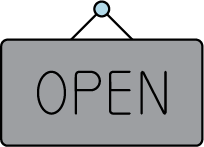How Banking in Canada May Be Different
As banking services differ around the world, here
are some characteristics
of Canada’s system:
A National System of Banking
Canada has a national system of banking where many retail banks have branches throughout the country. The benefits of this national system mean that you have access to similar products at the same price regardless of where you live in Canada.
Consumers benefit from the high degree of competition and choice in the Canadian financial services marketplace. Today there are more than 80 domestic and foreign banks currently operating in Canada. Of those, more than 40 offer financial products and services to consumers – including bank accounts, credit cards, loans and investments.
Bank Deposits are Secure
Canadian banks are well-managed, well-capitalized and regulated, and have been recognized worldwide for their soundness and stability.
In the unlikely instance of a bank failure in Canada, your deposits in your Canadian dollar and foreign currency savings and chequing accounts as well as term deposits are protected, up to $100,000 per type of account per bank. The institution must be a member of the Canada Deposit Insurance Corporation (CDIC), and it’s important to note that all banks in Canada that take retail deposits are members of CDIC.
Costs
Fees for banking products and services can vary. There are low-fee and no-fee accounts available and higher fees may be charged on accounts that offer additional services. It’s important to understand what services you need and then to shop around for the account that best meets those needs.
It’s easy to compare bank account packages available using the online interactive Account Comparison Tool available from The Financial Consumer Agency of Canada (FCAC).
Interest Rates
Interest rates for different products are set by each bank. The decision on how much interest to charge on a loan depends on how risky the loan is and the prices that banks and other lenders pay to raise funds in the broader marketplace. Canada has a very competitive banking industry, so it’s important to shop around.
Opening an Account
You can open a bank account even if:
- you don’t have a job,
- you don’t have money to put in the account right away,
- you have been bankrupt, or
- you have no credit history
Generally, you will need two documents from a reliable source to open a retail deposit banking account – one of which has your name and address and another that has your name and birthdate. A list of the types of documents you may use is available on the Canadian Bankers Association website.
It’s also possible to present only one document that indicates your name and date of birth if your identity is also confirmed by a customer in good standing with the bank or by an individual of good standing in the community where the point of service or branch is located.
You may also be able to open a bank account with proper identification if you are not a Canadian citizen. More information is on the Financial Consumer Agency of Canada website.
Starting a Business
Many newcomers to Canada want to start their own businesses and look to banks for financial advice, services and products. Most bank business customers are small businesses and banks work hard to meet the needs of this large and diverse group.

Banks offer financing, information, advice and many other services to help people start and manage their businesses, including educational and planning resources such as seminars and workshops, credit cards for small business, lines of credit, overdraft protection, telephone banking, online banking, venture loans, and payroll and cash management services.
To learn more, visit www.cba.ca.